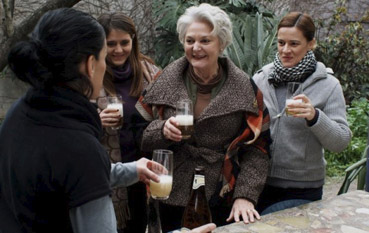Peppy and lighthearted, Mother Tongue proved a welcome tonic amongst many of the harder-hitting films at the 26th BFI London Lesbian & Gay Film Festival. Almost all the buzz-worthy hot tickets I sought out at a week of LGBT themed features on the Southbank were populated by despondent and despairing protagonists, writhing in agonized spiritual squalor and doomed from the opening frame.
After being knocked around by the contentious sexual violence of both Beauty and American Translation, the comically exasperated mother of Liliana Paolinelli's film provided some much needed warmth and gentle laughs.
The opening sees Estela (Claudia Lapacó) fainting on the kitchen floor after her daughter, long-term lesbian Ruth (Virginia Innocenti), finally outs herself in a deluge of caustic drollery. Like an uncorked genie, one world-shattering announcement isn't enough. As if to make the revelation of her sexuality seem less of a big deal, she also divulges that her sister (Ana Katz) has had four abortions (at least the ones she's been told about) and that, as a recreational drug user, she prefers marijuana to coke. Such dry, dysfunctional wit points to seventy-eight minutes of belly-aching comedy, yet this triple-barreled salvo quickly proves to be the film's acerbic high point. The barbs remain chucklesome throughout, but never quite match the comedic highs of the wickedly funny opening.

Though even big belly laughs can't disguise how the middle class reality is completely at odds with the absurd scenario. For one thing, these girls aren't exactly Jerry Springer material. You'd expect the sister, after four abortions, to be a tarted up chav, repeatedly getting knocked up at the back of a Tesco car park somewhere, but no, she's well groomed and glossy in a perfect vintage leather jacket and steady relationship. On first inspection, she's not the only character who doesn't add up. Ruth's girlfriend enquirers about her mother's health after the kitchen episode only to then callously shrug it off as an over-reaction – never mind her generational values – clearly, as a heterosexual woman, she's the crazy one!
The characters as they are (unconvincing attitudes and seriously lacking capacity for self-reflection), focus all hopes of engaging with the material on Estela's over-zealous attempts at coming to terms with her daughter's lifestyle. Buying everything on the lesbian bookshelf and doing research like an undercover actor at a lesbian bingo night (yes, really!) are two such episodes in what amounts to an extended setup for a soap opera style dinner party, where it's discovered that Ruth's girlfriend (Claudia Cantero) is having an affair with her straight intern (Mara Santucho). Cinematic law states that it's not a party until someone gets broken, tears and drama forcing a newfound closeness between formally bigoted Mum and dithering daughter with delicious irony.
For a woman of her age and outlook, Estela's late-in-life journey of embracing change, despite everything ingrained, is one brimming with dramatic possibility. Sadly, Paolinelli's fixation on lightness of touch means we only ever see her old age confusion played for comic effect, a mistake not unlike the one made so erroneously by Mike Mills with Beginners, who instead of exploring the septuagenarian complexities of the gay lifestyle, opted instead to make a Sundance formula film of maddening preciosity, in which hipsters rollerblade down hotel hallways and a manic pixie dream girl feigns throat cancer, talking only through meet-cute post-it notes whilst dressed as a silent movie star.
While nowhere near as gratingly twee, Mother Tongue never skirts far from cutesy. Confessing her daughter's sins, knowing that she'll never come to church of her own accord, Estela is appalled when the priest can only offer Ruth damnation and torment. Desperate, Estela appeals to him as a mother, and the harassed priest assures her that damnation will be enough. When Estela tells her other daughter that Ruth is gay, the boyfriend is quick to claim twenty bucks owed to him on a longstanding bet over Ruth's sexuality. The air of light amusement is a constant, yet in spite of the rigorous directorial hand, on several occasions the central performance astonishes with sensitive hints of revitalization underneath the featherweight laughs. As Estela explores the lesbian scene, meets Ruth's exs and current girlfriend, she makes new friends in the process, and for the first time her twilight years promise excitement. What could have very nearly transformed into something deeply enriching and life-affirming never gets the opportunity, so desperate is the urge to wring every last laugh from farcical family frictions - and that would be just fine were it not for the mean-spirited flogging of mother and daughter in the final few images, a misanthropic lurch that comes out of nowhere and unduly disturbs with its sexual literalizing of the title. Admittedly, it's the bleakly deranged ending (unexplainably accompanied by militaristic credits music) that stays with you, but for all the wrong reasons given that it's a cheat from a different film entirely. Spanish may not be my mother tongue, but something clearly got lost in translation in the film's journey from script to screen.
Screened at the 26th BFI London Lesbian & Gay Film Festival.
At present the film has no set UK release date.
|